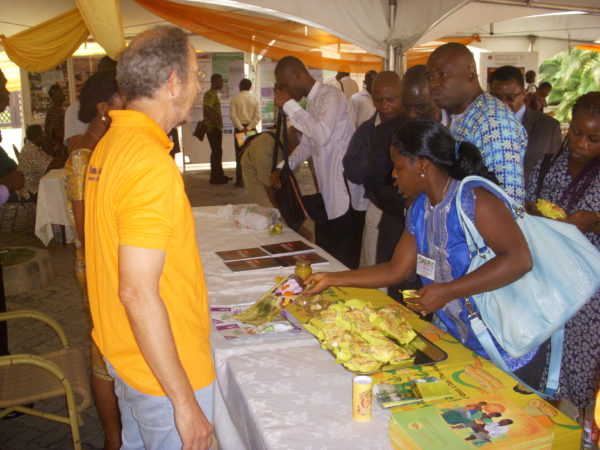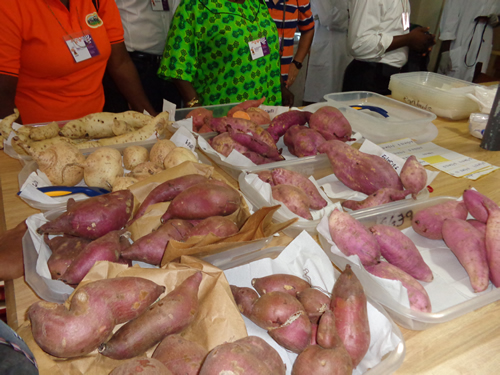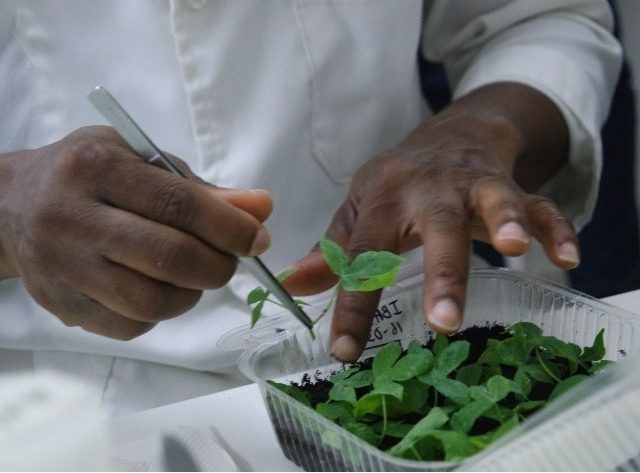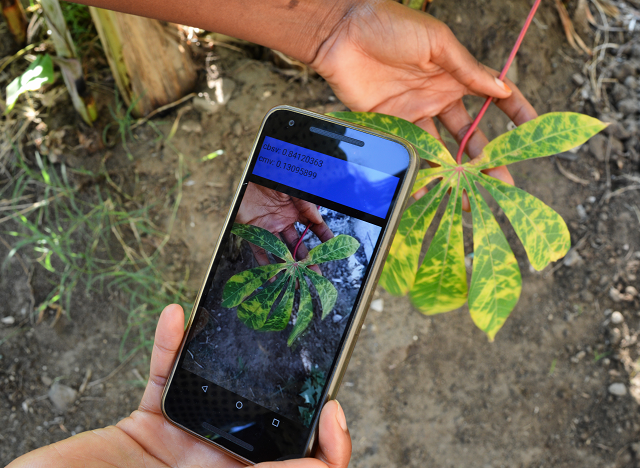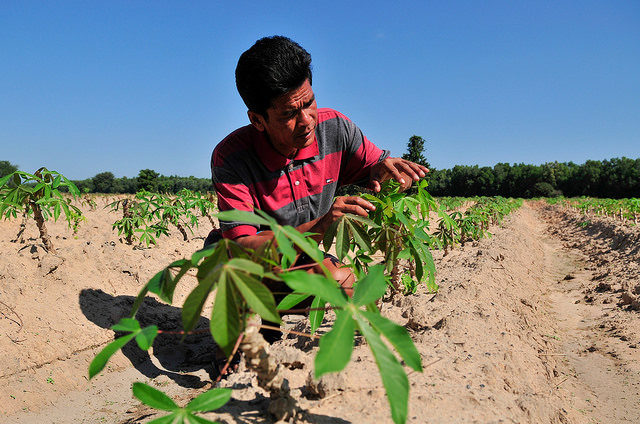Sweetpotato and yam bean researchers from the International Potato Center (CIP), and partners in Sub-Saharan Africa spent the first week of October 2013 in Accra, Ghana along with a host of other root and tuber crop researchers at the 12th International Symposium of the International Society for Tropical Root Crops – Africa (ISTRC-Africa).
The themes of the ISTRC-AB meeting were: ‘Competitiveness of Root Crops for Accelerating Africa’s Economic Growth’ and ‘Harnessing Research Innovations to Unleash the Potential of the Yam’.
The event was a great opportunity for representatives from a range of organisations to come together to discuss key issues relating to root crops in the Sub Saharan African region. In particular, the ISTRC-Africa symposium provided participants with the opportunity to partner, compare notes and develop strategies to unleash the potential of the root and tuber crops.
“Root and tuber crops (sweet potato, cassava, and yams) provide great opportunities for long-term poverty alleviation and food security much more than any other staple foods produced in the African, Caribbean and Pacific regions,” said Ghanaian President Mahama who was represented by Mohammed Alfa, Deputy Minister, Ministry of Environment, Science and Technology Innovation.
For sweetpotato researchers, a highlight of the ISTRC-AB meeting was the 6th biennial meeting of the Sweetpotato Support Platform for West Africa which attracted over 120 participants to a plenary session.
Another highlight occurred at the SPHI exhibit stand when conference-goers were offered packets of Akarabo Power Biscuits, the product of the Rwanda SuperFoods component of the SASHA project. The biscuits were gone in seconds!
The week-long event attracted over 200 hundred local and international scientists, donors, farmers, and other development partners.
The 12th ISTRC Symposium was organized with support from the government of Ghana, the Council for Scientific and Industrial Research (CSIR), IITA, CGIAR Research Program on Roots, Tubers and Banana (RTB), HarvestPlus, African Development Bank-funded Support for Agricultural Research and Development of Strategic Crops (SARD SC) project, IITA-Yams Improvement for Incomes and Food Security in West Africa (YIIFSWA), Ministry of Food and Agriculture (MOFA), National Root Crops Research Institute, Umudike; the Federal Government of Nigeria, the Food and Agriculture Organization (FAO), International Potato Center (CIP) and several other organizations.
Next on the agenda was the 4th Annual SPHI Technical and Executive Steering Committee Meeting which was a chance for senior staff from CIPs SPHI Projects to discuss key highlights from the 4th year of the project. This included discussions around the vision of SPHI; monitoring of SASHA progress; the African Potato Association Meeting and SPHI expansion.
The meeting was a great opportunity for the SPHI Community from across Sub-Saharan Africa to discuss outcomes, devise strategy and learn from one another across the spectrum of SPHI projects and research.
The group discussed a wide range of topics including the potential of sweetpotato as part of West African productivity; RNAi sequencing as a new approach for tackling weevil resistance; conventional breeding strategies; breeding progress in national programs; CloneSelector development and decentralized vine multipliers.
Field trips were also part of the agenda, with participants also visiting local SPHI projects including the Sweetpotato Support Platform Postharvest & NIRS lab; the screen house complex, field plots; the WAAPP biotech facility and tissue culture lab as well as taking part in taste evaluations.
Participants also engaged in high level, expert led panel discussions on the topics of: ‘What are we learning from different farmer multiplier experiences with Net Tunnels’ and ‘Sweetpotato Processing in Ghana: What we have tried, What is the way forward, and What might we learn from China and elsewhere’.
Country focused projects were also examined and lessons learnt analysed across a range of key projects including ‘Rooting Out Hunger in Malawi’; ‘Integrating Orange in Zambia’ and ‘Understanding gender roles in Nigeria’.
Overall the conference was a valuable opportunity to reflect on SPHI projects thus far and to plan and develop strategies moving forward.
VIDEOS: Watch the video on RNAi sequencing in action and the advertisement for the Rwanda Akarabo sweetpotato based biscuit – two project highlights which were discussed at the meeting.
FURTHER INFORMATION: For further information about the 4th SPHI Executive Technical Meeting including access to papers and presentations visit here. And for more detail about the 12th International Symposium of the International Society for Tropical Root Crops – Africa visit the IITA website.
For more information about CIP SSA’s Sweetpotato projects please visit: http://cipotato.org/sweetpotato

Team Sweetpotato! Participants at the 4th Annual Technical and Executive Steering Committee Meeting of the Sweetpotato for Profit and Health Initiative (SPHI).

Sweetpotato celebrations Performers from the Cultural Center in Kumasi, Ghana provided entertainment during a break at the SPHI meeting.
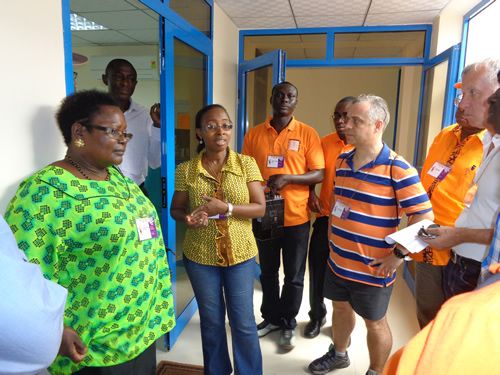
Field Tripping: During the field trip participants at the SPHI meeting visited the CSIR-Crops Research Institute. Here, Marina Quain introduces visitors to the new biotechnology building at the Institute.
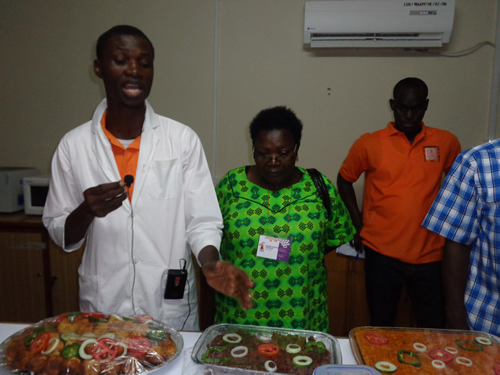
Sweetpotato Cuisine: Mpotompoto & other locally-appropriate sweetpotato dishes on display at the SASHA postharvest laboratory at CSIR-CRI during the field trip.
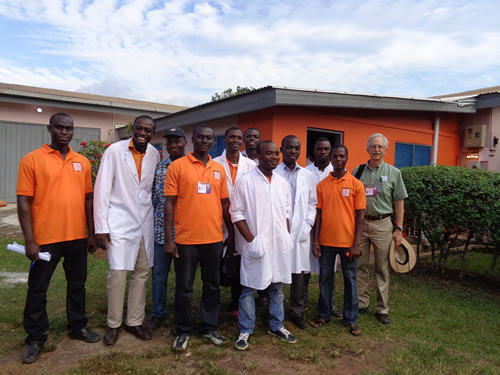
Lab Visits: The postharvest team (in white) and a group of visitors outside the laboratory during the field trip.
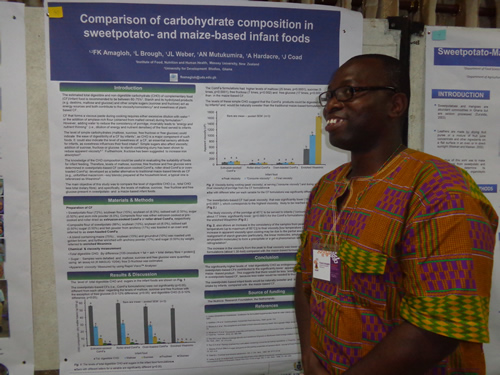
Sweetpotato Learning: Dr Francis Amagloh of the University for Development Studies took first place in the Researcher category of the poster competition at the SPHI meeting.

